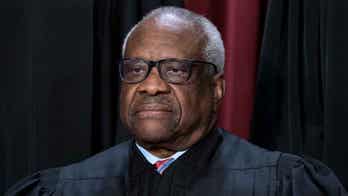
Secretary of Defense Robert Gates speaks during the change of command ceremony in Baghdad Sept. 1. (AP Photo)
CAMP EGGERS, Afghanistan -- Defense Secretary Robert Gates touched down in Kabul Thursday, in a surprise visit to Afghanistan for a lightning round of strategy sessions with top commanders and Afghan President Hamid Karzai.
Gates's visit to Afghanistan, his ninth since taking office in 2006, comes amid an intensifying -- and increasingly bloody -- U.S. war effort here. Three U.S. service members have already been killed in Afghanistan this month, and the number of U.S. casualties this year already exceeds the 304 who died in the war in 2009 -- itself a record high in the nine-year conflict.
In an interview with Fox News conducted on Wednesday in Baghdad, where Gates and Vice President Biden commemorated the formal end of U.S. combat missions in Iraq, the defense secretary predicted U.S. forces will remain deployed in the Afghan theater for several years to come. That assessment comes as the Obama administration prepares, at year's end, for another round of internal deliberations, and likely debate, over its conduct of the war.
Late last year the Obama administration announced, after an extensive review, that it was going to "surge" into Afghanistan an additional 30,000 troops. Almost all of those troops have now arrived in the country, bringing the total number of U.S. forces here to about 100,000. At the same time, President Obama set July 2011 as the date when some forces will begin to withdraw.
But General James Conway, commandant of the Marine Corps, told reporters last month that it will be "a few years" before Marines in Afghanistan's southwest battleground of Helmand Province can transfer control of security operations there to Afghan forces. And a week before Conway's comments, Gen. David Petraeus, the top U.S. commander in Afghanistan, described the U.S. mission there as "a long-term proposition."
Asked about these comments by his generals, Gates at first said such forecasts were not "knowable." The Pentagon chief said troops will begin to withdraw in July, then reaffirmed that the volume and pace of withdrawals of U.S. troops will be determined by conditions on the ground, which he said could change quickly.
"My gut tells me that we will probably have a troop presence in Afghanistan for some period of time," Gates said. "I don't know what that period of time is. I would say certainly more than two years. But I don't know what that length of time would be. It will depend on the success of our operations; it will depend on the pressures the Taliban feel themselves under when they discover in August of 2011 we're not gone."
Gates was less ready to endorse additional comments made by Conway during a lengthy Aug. 24 session with reporters, in which the top Marine said the July 2011 policy is "probably giving our enemy sustenance." As evidence for that assertion, Conway cited enemy chatter picked up by U.S. intelligence.
"We've intercepted communications that say, 'Hey, you know, we only have to hold out for so long,'" Conway said. Gates told Fox News that Conway, who is soon to retire, is "entitled to his professional military opinion," then added tartly: "I don't think you've heard any of the other (members of the joint) chiefs or the chairman say that."
Briefing reporters at Camp Eggers on the day of Gates' arrival in Afghanistan, Petraeus suggested U.S. and allied forces are now well positioned -- for perhaps the first time since the Taliban began to reassert itself, five years ago -- to execute Petraeus' "clear, hold and build" counter-insurgency strategy. In addition to the 100,000 U.S. troops now in Afghanistan, some 49 nations have deployed or pledged to deploy their own forces, bringing the total number of allied troops in the fight against the Taliban and affiliated terror networks to 150,000.
Germany, for example, is leading an operation in Baghlan, in the center of the country, while Spain and Italy are taking the lead in Badghis, in the west.
In a blitz of recent television appearances, Petraeus -- mindful that support for the war back at home is ebbing, as the conflict approaches a decade in length and casualties increase -- has repeatedly emphasized that he and his commanders now have "the right inputs" to wage the war on both military and non-military fronts.
He repeated that phrase Thursday as he flashed a laser pointer at a wall full of outsized, detailed, color-coded flowcharts that described various aspects of allied strategy and tactics. "We're just about at the point now where we have indeed got all the forces on the ground, they're moving into operations, got quite an all-star team out here," he said.
Petraeus also alluded, vaguely, to ongoing negotiations between the Karzai government and top Taliban commanders in which it is hoped the two sides might reach some kind of truce.
"The prospect for reconciliation with senior Taliban leaders certainly looms out there," Petraeus said Thursday. "And there have been approaches at (a) very senior level that hold some promise."
As he was leaving the briefing room, Petraeus turned to hear the question shouted out by a reporter: "Are we going to be here for several years, as General Conway said?"
Petraeus chuckled and headed for the door.




